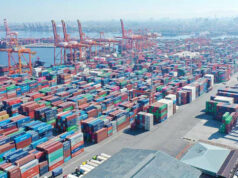SRI LANKA President Maithripala Sirisena is expected to sign a five-year partnership with the International Rice Research Institute (IRRI) in Los Baños, Laguna on Friday, as part of his state visit in the Philippines.
According to IRRI, the partnership aims to boost Sri Lanka’s rice sufficiency goals and help mitigate effects of climate change.
“IRRI and Sri Lanka will sign a five-year work plan that will complement and help implement Sri Lanka’s National Plan for the Rice Sector,” IRRI Media Relations Specialist Leoniza O. Morales said in a mobile message.
“The partnership will be on research and development of high-yielding & climate resilient rice varieties, post-harvest mechanization and technologies, and the use of geographic information systems in rice production,” Ms. Morales added.
IRRI noted that Sri Lanka had been self-sufficient in rice until 2017 when it experienced the worst drought in 37 years, followed by heavy rains which flooded many areas. Such effects of climate change led Sri Lanka to import rice amounting to 700,000 tons, IRRI said.
In June, Sri Lanka’s Ministry of Agriculture signed an agreement with IRRI to prioritize improving exchange of rice varieties and germplasm, developing hybrid rice, ensuring efficiency in rice-based agriculture food systems, water use, mechanization, climate change resiliency, and strengthening the national capacity for agriculture leadership.
IRRI announced then that it will sign an official work plan with Sri Lanka “in the near future” for the outlining of a precise action to further the country’s food and nutrition security through rice-based agri-food systems in Sri Lanka.
IRRI’s partnership with Sri Lanka dates back more than 50 years, with IRRI helping the country conserve the genetic diversity of its rice varieties through IRRI’s rice gene bank.
Some 2,027 varieties in IRRI’s gene bank out of more than 129,000 are native to Sri Lanka. — Reicelene Joy N. Ignacio



